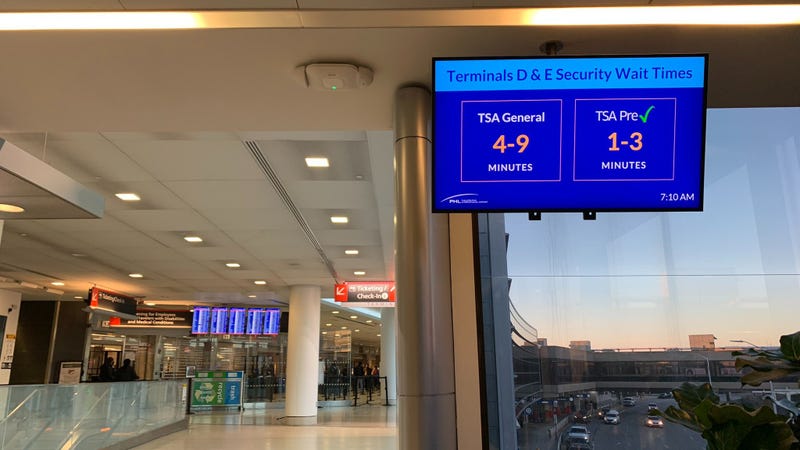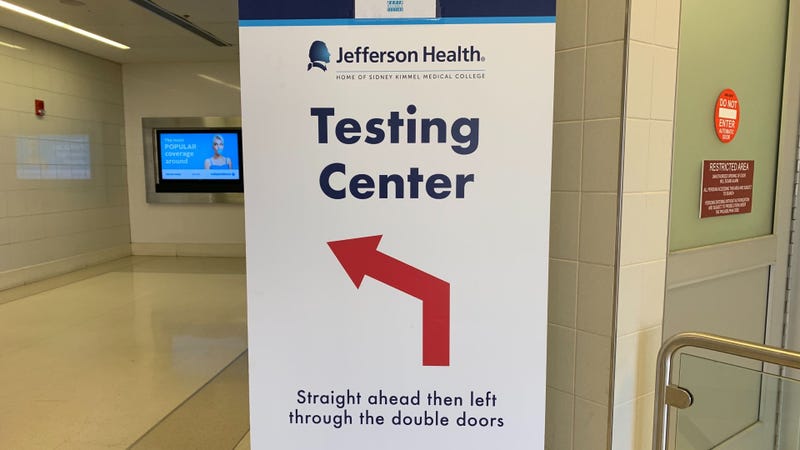
PHILADELPHIA (KYW Newsradio) — Many Americans are getting more comfortable with long-distance travel after waiting out the coronavirus pandemic for a year or longer, experts say. Signs indicate that the impulse to travel will only grow — as long as new variants of the virus don't disrupt the industry beyond recovery.
Deloitte polled 6,512 Americans for their November Holiday Travel Survey and found that four in 10 respondents expect to travel for the winter holidays, and one in three will travel by plane, CNBC reported.
Philadelphia International Airport estimates 934,624 arriving and departing travelers will make their way through between Dec. 22 and Jan. 4. Airport officials expect the busiest days to be the three days after Christmas, Dec. 26 through Dec. 28.
That total is down 19% from pre-pandemic travel in 2019, but it is quite a rush when compared with 2020, up 60%.
Prices, crowds and cancellations — up, up and up
But beware, say experts. Add the increase of domestic traveler demand to the influx of foreign travelers who have been coming to the U.S. since early November; combine that with travel restrictions and airline staffing shortages, and experts say we will see higher prices, more crowded airports, and a greater potential for flight cancellations.
Just days before the Nov. 22 deadline for federal workers to have at least one COVID-19 vaccination, reports were showing that as many as 40% of U.S. airport security screeners were still noncompliant. As the deadline hit, the White House touted a 99% compliance rate among FAA employees, 93% among TSA workers, and 98% among Customs and Border Protection staff. Still, the American Federation of Government Employees says there could be worker shortages at security checkpoints during the December travel season if TSA takes a hard line on those workers who are still unvaccinated.

So as holiday crunch time nears, travelers are advised to prepare for long or slow security queues. At least timing won't be such a mystery now that screens displaying security wait time have been installed at the Terminal D/E security checkpoint.
To be safe, PHL says passengers should arrive at least three hours before all scheduled boarding times.
Be aware also that parking at PHL could trip up even the best laid plans. PHL expects onsite garages to be at capacity through the holiday season, and the economy parking lot, closed since the start of the pandemic, will remain closed indefinitely. Travelers driving themselves to the airport will need to use private short- or long-term parking operations off site. Operators may provide airport shuttles, but it all adds up to extra time to account for.
And when travelers finally arrive at their destinations, they can expect to spend more on the ground, too. According to AAA, mid-range hotel rates have increased about 39% and daily car rental rates have increased 4% over last year.
New COVID-19 travel restrictions
Complicating matters further are new travel restrictions put in place while the world tries to make heads or tails of the omicron variant of COVID-19.
Not long after the U.S. reopened its borders to fully vaccinated travelers from countries across all continents, concerns over omicron prompted new, albeit temporary, bans on travel from South Africa and seven other southern African nations.
“We all feel very badly about the hardship that that might have put upon not only South Africa but the other African countries. And for that reason, in real time, literally on a daily basis, we’re reevaluating that policy,” infectious diseases expert and President Joe Biden’s chief medical adviser Dr. Anthony Fauci said on CNN.

Since naming omicron as a variant of concern, some 56 countries have issued similar travel restrictions.
No one who has been exposed to or is sick with COVID-19 will be able to fly. And the CDC guidance for unvaccinated or partially vaccinated travelers, both domestic and international, is to get tested before and after their trip. In fact, since omicron, COVID-19 testing requirements for travelers have been made even more strict.
For a time, travelers were required to show proof of a negative COVID-19 test taken within 72 hours of departure to the U.S. Since Dec. 6, however, passengers traveling internationally have been directed to get tested no more than one day before entering the U.S. — regardless of vaccination status or citizenship. This applies to all travelers age 2 and up.
An exception is people who have recently recovered from COVID-19. They can travel with documentation of their recovery, such as a positive COVID-19 viral test result on a sample taken no more than 90 days before the flight's departure from a foreign country, plus a letter indicating clearance to travel from a doctor or public health official.


Jefferson Health operates a COVID-19 testing facility at PHL in the Terminal E departures building, offering several options seven days a week for asymptomatic passengers flying out of Philadelphia. Registration is available online.
The testing mandates will be enforced by airlines, so passengers are advised to check with their airline and their destination for specifics.
The World Health Organization recommends putting off all travel to areas with high community transmission for anyone over 60 years old who is not vaccinated or not yet recovered from COVID-19.
Mask mandates
Besides rules on vaccination and testing, the longstanding requirement to wear a mask on planes and trains and at transportation hubs has been extended and will be in effect through at least March 18. TSA fines for violating the mask mandate have ranged from $500 to $3,000 since September.
Even that may not be enough to convince those travelers who oppose mask mandates to comply. The last year has seen some spectacularly awkward moments on airplanes involving unruly behavior from unhappy passengers. The FAA says it has referred 37 such cases to the FBI for possible criminal prosecution since the number of these in-flight disruptions started trending upward a year ago.
David Pekoske, administrator of the TSA, told NBC’s "Today" that he is still "very concerned" about the issue.
"The level of unruly behavior is much higher than I’ve ever seen it," he said.
Travel insurance
One effect of all these factors, which may leave travelers stung by canceled or delayed flights, is an uptick in travel insurance purchases. According to AAA, 31% of American travelers say the pandemic has made them more likely than before to purchase insurance for trips between now and the end of 2022.
In fact, travel insurance sales jumped 53% in the days immediately after the discovery of omicron, Forbes reported, citing data from travel insurance comparison provider Squaremouth.
"Travel insurance is relatively inexpensive for the large amount of peace of mind it affords, and that’s more valuable than ever in light of the pandemic," said Paula Twidale, senior vice president of AAA Travel.
All aboard!
Some travelers will opt for rail travel instead. It might take longer to reach one's destination, but there are some distinct advantages. For one thing, there's no dreaded middle seat on Amtrak trains. And passengers can check four bags for free. As an extra bonus, Amtrak is waiving change fees for ticket reservations made by Jan. 4, 2022.
And sometimes you can't beat the scenery rolling by outside.
Philadelphia's 30th Street Station is Amtrak's third-busiest station, after Penn Station/Moynihan in New York City and Union Station in Washington, D.C., said Beth Toll, Amtrak public relations manager.
Amtrak says ridership nationwide dropped 95% at the beginning of the pandemic. In the last year and a half, it has recovered somewhat, but numbers are up to only about 75% to 80% of pre-pandemic ridership across the entire system, Toll said.
In 2019, about 114,000 rail passengers arrived or departed from 30th Street Station from a couple of days before Christmas to a couple of days after New Year's Day, according to Amtrak data. In 2020, COVID-19 restrictions and fear stoked by the pandemic caused the number to drop to about 29,000, Toll said.
Nationwide, ridership was at about 1,180,000 during that pre-pandemic 2019 holiday travel season. And similarly, the figure dropped to about 272,000 riders.
As more travelers venture out this year, hot spots along the Northeast Corridor, where some of the busiest stations are located, could see excessive crowding at peak travel times through the holidays. They include Philadelphia, Baltimore, New York City, Washington, Newark, Boston and Providence.
As with air travel, riders are required by federal law to wear a face covering at all times, aboard trains and in stations, and regardless of vaccination status or state or local laws.




